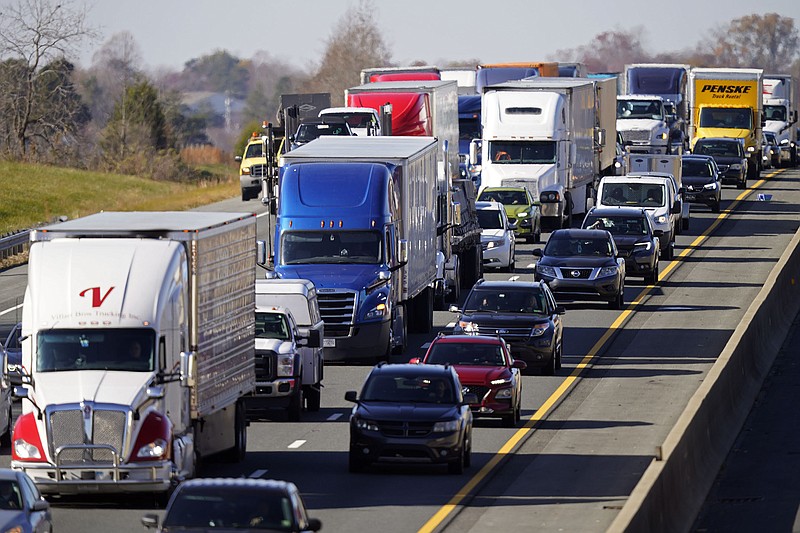WASHINGTON -- The Federal Trade Commission has ordered nine large U.S. companies, including Walmart, Tyson Foods Inc., Amazon and Procter & Gamble, to provide detailed information about their operations in a bid to unravel the causes of the supply chain disruptions that are clouding the economic recovery.
The commission's order, approved Monday in a 4-0 vote, came as President Joe Biden met at the White House with corporate chieftains in the latest display of presidential concern over supply chain snarls.
The president was scheduled to speak after the meeting with the chief executives of companies such as Food Lion, Mattel and Best Buy. But the White House rescheduled his comments for today, saying the president wanted to spend more time with the CEOs.
[Video not showing up above? Click here to watch » arkansasonline.com/121supply/]
Spokesmen for Walmart and Tyson Foods declined to comment Tuesday on the FTC order.
The meeting was part of a larger effort by the president to show that he is doing everything he can to combat inflation and ensure a more normal Christmas shopping season as covid-19 continues to persist. Biden has made a push to unclog ports, address trucker shortages and take other steps to alleviate the pressure created by consumers looking to buy couches, cars and electronics instead of eating out or going to theme parks.
But the White House has limited reach to affect a supply chain that is controlled by private companies and shaped by larger forces, like the pandemic and consumer demand.
Still, top officials sought to reassure a nervous public Monday that consumers would be able to purchase what they want.
"There are going to be toys on your shelves," Jen Psaki, the White House press secretary, told reporters. "There is going to be food in your grocery stores."
While the FTC move will do nothing to ease the economy's current bottlenecks, it could shape future regulatory actions intended to maintain or increase the amount of competition in key industries, according to antitrust specialists.
The White House and some independent analysts have blamed a lack of competition throughout the supply chain for many of the current problems, which are fueling inflation and depressing the president's approval ratings. Biden this summer issued an executive order calling for regulators to crack down on consolidation in the ocean shipping and freight rail industries as part of a broader competition initiative.
"We've had an incredible amount of consolidation in the supply chain. ...That's why it's been unable to withstand the kind of shock we've seen with the pandemic," said Diana Moss, president of the American Antitrust Institute. "We are now learning the hard way what 40 years of unbridled consolidation and lax merger enforcement mean."
FTC chairman Lina Khan said the goal of the commission study is to "shed light on market conditions and business practices that may have worsened" the supply jams that were the focus of Monday's White House event.
In recent weeks, top administration officials have worked to hammer out agreements among ocean carriers, port executives, terminal operators and trucking companies to smooth tangled supply lines. At the neighboring ports of Los Angeles and Long Beach, longshore workers have made headway clearing out some of the tens of thousands of shipping containers that have been crowding the docks.
Yet other problems, including stacks of empty containers bound for Asia, continue to hobble operations.
The FTC started the supply chain investigation using its authority to conduct wide-ranging studies without a specific law enforcement purpose. Such efforts can uncover information that would lead officials to open an investigation or could reshape their enforcement strategy.
In the early 2000s, after repeatedly failing in efforts to block proposed hospital mergers, the FTC started a Section 6b study, which enabled the commission to thwart future combinations.
The commission is an independent agency that shares responsibility for antitrust enforcement with the Department of Justice and can crack down on deceptive business practices that harm consumers.
A commission spokeswoman did not respond to a request for comment.
With its supply chain investigation, the commission will need to distinguish between price increases that reflect the workings of supply and demand, and those that result from improper business links, said a former FTC official, who asked for anonymity to discuss the commission's work.
FTC lawyers will review information gathered from the individual companies, looking for indications that producers and wholesalers may have contractual arrangements that favor large retailers over their smaller rivals, the former official said.
"They're trying to see if there are things gumming up the works," the former official added.
Along with Walmart, Tyson Foods, Amazon and P&G, commission orders for information are being sent to Kroger Co., C&S Wholesale Grocers Inc., Associated Wholesale Grocers Inc., McLane Co. Inc., and the Kraft Heinz Co. (Amazon founder Jeff Bezos owns The Washington Post.)
The CEOs of Kroger and Walmart participated in the White House session with the president a few hours before the FTC sent them its order.
The commission is seeking information from consumer product makers, wholesalers and retailers. Under [Monday's] action, the nine companies have 45 days to provide internal documents, including details of their supply-chain strategies; pricing; marketing and promotions; costs; profit margins; selection of suppliers and brands; and their market shares.
"In addition to better understanding the reasons behind the disruptions, the study will examine whether supply chain disruptions are leading to specific bottlenecks, shortages, anti-competitive practices, or contributing to rising consumer prices," the FTC said in a statement.
Information for this article was contributed by David J. Lynch of The Washington Post; and by Jim Tankersley and Ana Swanson of The New York Times.
